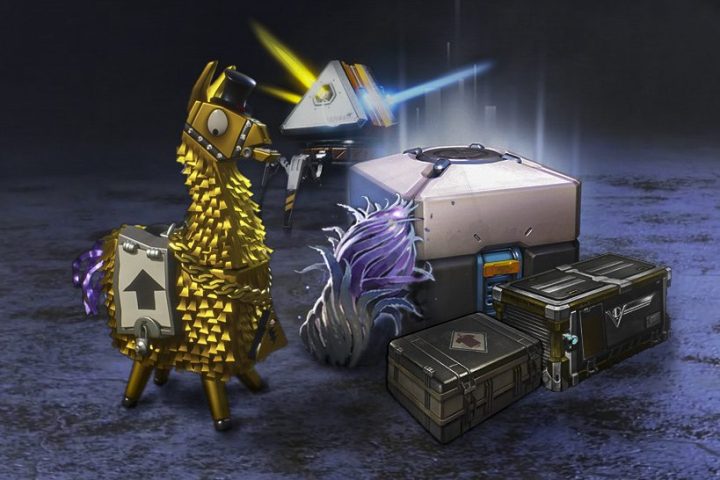
A new bill aims to tackle the problem of predatory loot boxes and pay-to-win micro-transactions in video games. Introduced by Senator Josh Hawley of Missouri, the Protecting Children from Abusive Games Act would ban the inclusion of these mechanics in video games aimed at or played by minors — everyone under the age of 18.
With loots boxes and pay-to-win micro-transactions a constant sticking point in the gaming community, and a burden on nearly every parents’ wallet, it’s hard to imagine Senator Hawley will be met with much push back on the issue, but surprisingly he has. If this bill were to pass, it would incite some huge changes.
But what kind of changes? What does the bill entail? What qualifies as loot boxes and pay-to-win micro-transactions?
Who is Senator Josh Hawley?

Senator Josh Hawley is a Republican from Missouri, and also the youngest politician of the Senate. In June, he will have been in office for only five months, but he has already tackled issues in tech surrounding Facebook’s data collection of teens and changes to the Children’s Online Privacy Protection Act.
In partnership with Senator Ed Markey of Massachusetts and Richard Bluementhal of Connecticut, he now has his sites set on the problem of predatory micro-transactions in gaming, specifically in regards to children.
What are loot boxes and pay-to-win micro-transactions?
Loot boxes are purchasable virtual crates that when opened offer players an assortment of randomized items or “loot.”
Loot can come in the shape of cosmetic items, like character and weapon skins, in-game currency that can be used to purchase more virtual items, and in some cases, performance-enhancing items such as armor, weapons, and consumables. The latter, when directly purchased, is often referred to as a pay-to-win micro-transaction.

The term “pay-to-win” refers to the ability to advance or improve through making micro-payments in the game. This is heavily criticized in gaming communities because it gives the player willing to spend more money in the game the greatest advantage.
Loot boxes sell well. The appeal to players is a bundle of in-game items for your money, with the chance of containing something rare and valuable. More often than not, however, the result is a grab bag of common and easily obtainable items that the player doesn’t really want. The possibility of getting an awesome skin next time around encourages players to purchase more loot boxes, usually until the player finally gets what they’re looking for.
Because of its randomized nature, loot boxes are often viewed as a form of gambling. What’s worse is that they are usually offered in lieu of direct purchases of items, making them all the more predatory.
Overwatch, for example, routinely introduces new skins for its heroes. The coolest skins can be bought using currency earned through regular play, which is fine for the players who are already investing a lot of time into the game but might be difficult for someone who can’t or doesn’t want to invest as much time. That’s usually when players turn to loot boxes.
It would make more sense if Overwatch offered the option to buy the currency needed to obtain the skin, but that’s not possible. You have to take a chance on loot boxes.
How do loot boxes and pay-to-win transactions affect kids?
Micro-transactions are included in nearly every game you’ll find today, and that’s the problem. Kids play games.
Fortnite, PlayerUnknown’s Battlegrounds, Rocket League, Overwatch, Call of Duty, and more all contain some form of loot boxes and micro-transactions.
While you won’t find pay-to-win micro-transactions as frequently in console games (thanks to EA’s Star Wars Battlefront 2 debacle), they are very commonly found in mobile games, particularly those that are free-to-play. This is especially dangerous as free-to-play games are easily accessible, which means children are more likely to download and play them.
Children have sometimes accumulated hundreds to thousands of dollars in micro-payments without their parent’s knowledge or consent. By the time parents find out, a refund is no longer an option.

Fortnite is known for its questionable micropayment practices. Its skins are some of the most popular items in the game, with the most coveted typically locked behind some form of payment, whether it be the games’ purchasable virtual currency “V-Bucks” or a $10 season Battle Pass.
Games frequently add more pressure to buying these items by adding a sense of urgency to the purchase. You’ll usually find that cosmetic items in games are only available for a limited time, or that a game is gating progress through long wait times or hard-to-reach level requirements that can be completed more quickly through a form of micro-payment.
Children are susceptible to this kind of content. It’s appealing to the average player, but even more to a child that is still learning the value of money or can easily confuse spending in-game currency with a micro-payment, as the two are usually linked or used interchangeably in games.
What does the anti-loot box bill consider loot boxes and pay-to-Win micro-transactions?
Our understanding of loot boxes and pay-to-win micro-transactions may differ from what’s outlined in Senator Josh Hawley’s newly proposed bill.
The bill broadly describes loot boxes and pay-to-win micro-transactions as “add-on transactions” that “unlock a feature of the product” or “adds to or enhances the entertainment value of the product.”
Further in, the bill breaks down exactly what this means. The following is a brief summary of the specifics.
Pay-to-win micro-transactions:
- Ease user progression
- Assist in accomplishing achievements and awards that would otherwise not be possible
- Permit users to access content that was previously accessible but is now inaccessible after a timer or number of gameplay attempts
Loot Boxes:
Randomly or semi-randomly —
- Unlocks a feature or enhances the entertainment value of the product
- Allows the user to make one or more additional add-on transactions that the user couldn’t have made without the first
- Unlocks content unknown to the user before the first add-on transaction
What will the anti loot box bill do?
If passed, Senator Hawley’s bill would regulate pay-to-win micro-transactions and the sale of loot boxes in games marketed to minors (individuals under the age of 18).
These regulations would apply not only to already-published games but to those distributed in the future. Games played by minors would not be allowed to make updates that enable loot boxes or pay-to-win micro-transactions.
The bill describes a game played by children as a “minor-oriented game” and will factor in the target audience, subject matter, art style, character animation, music, sound, and much more when determining whether or not a game falls into this category.

The bill includes exclusions which consider transactions for subscription fees, difficulty modes, cosmetic alterations, and DLC as exceptions.
This is obviously a quick and easy version of the contents found in the bill, which you can totally read for yourself.
What games will the anti-loot box bill effect?
If the bill is passed, it’s incredibly likely that any game with an ESRB rating under “M” would apply. This includes popular titles:
- Fortnite
- Apex Legends
- Overwatch
- PUBG
- Rocket League
- Dota 2
- Hearthstone
- League of Legends
- Heroes of the Storm
And many more. It’s uncertain that games rated over “M” will be affected, as the standards outlined in the bill leave a lot open to interpretation. Call of Duty: Blacks Ops 4, for instance, is rated “M” but has items like the Tactical Unicorn gun that might be considered “minor-oriented” content.
Where’s the anti-loot box bill now?
Senator Josh Hawley officially introduced the bill on May 23, 2019, with democratic Senators Ed Markey of Massachusetts and Richard Bluementhal of Connecticut signing in support of the bill.
The bill is now in its first stage of a three-part legislative process. It will have to be presented to, studied by, and released by a committee before it can be debated, amended, and voted on. If the vote is in the bill’s favor, it will move on to the second part of the process in the Senate. This process is then repeated, and if it passes another vote, it will return to the House and Senate for final approval.
If approved, the President will then have 10 days to veto or pass the bill.
You can follow updates on the bill on govtrack.us.


